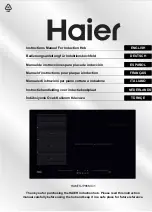
10
Tips and tricks
▯
When the heating up light goes off, place the food
on the appliance. This also applies when raising the
temperature to fry a second item which requires a
higher setting.
▯
Press the pieces of meat, poultry or fish flat onto
the frying surface using the spatula. Only turn the
meat, when it comes away from the surface easily,
in order to protect the structure of the meat.
Damaging the structure can cause juices to escape
and results in the meat drying out.
▯
Keep the pieces of meat, poultry or fish apart so
that they do not draw any liquid.
▯
Avoid pricking or cutting meat before or during
frying, in order to retain meat juices.
▯
Do not salt the food before frying, to prevent liquid
and soluble nutrients from escaping.
▯
Turn fish fillets in flour before frying. The fish will
be easier to turn.
▯
Turn fish fillets only once if possible. Place fish
onto the appliance with the skin facing downward.
▯
Use oil and fat that is suitable for frying, for
example plant oil or concentrated butter.
▯
The frying surface reaches its highest temperature
in the centre, the temperature is slightly lower at the
sides. Use the whole surface area when cooking
different foods which require slightly different
temperatures and frying times. When selecting the
food consider that thinner food can be fried at a
higher temperature and therefore needs a shorter
frying time.
▯
When using only one heating zone, select the
higher temperature from the settings table.
Alternatively, select a temperature about 10°C
higher than when using both heating zones. Use
approximately half the amount of food.
Using pots on the teppan yaki
It is also possible to use pots on the teppan yaki. This is
suitable for food preparation on low heat. If necessary,
you can quickly heat up the food on a hob and then
continue cooking on the teppan yaki.
Set the temperature to 140°C for melting, thawing or
keeping warm. Set the temperature to 160-200°C for
soaking rice or cereal or for warming up small amounts
of food.
Use heat-resistant pots with a lid. Be careful when
placing the pot onto the frying surface to avoid
scratching the stainless steel frame. Please note that
this method of cooking is not energy saving if the pot is
smaller than the frying surface.
It is possible to switch on only the front or rear frying
zone with the left control knob if you do not want to use
the whole frying surface. Place the pot on the area of
the frying zone which has the ideal temperature for your
food.
Banana in coconut (4 halves)
180 - 190 °C
6 - 9 min.
Side dishes and miscellaneous
Rice, boiled (500 g)
190 - 200 °C
5 - 7 min.
Pine nuts (300 g)
160 °C
5 - 7 min.
turn often
Rice noodles, boiled (400 g)
200 - 220 °C
4 - 5 min.
Tofu (300 g)
200 - 220 °C
3 - 5 min.
turn often
Croûtons (100 g)
170 °C
10 - 12 min.
turn often at the beginning
Food
Temperature
Time
Remarks











































